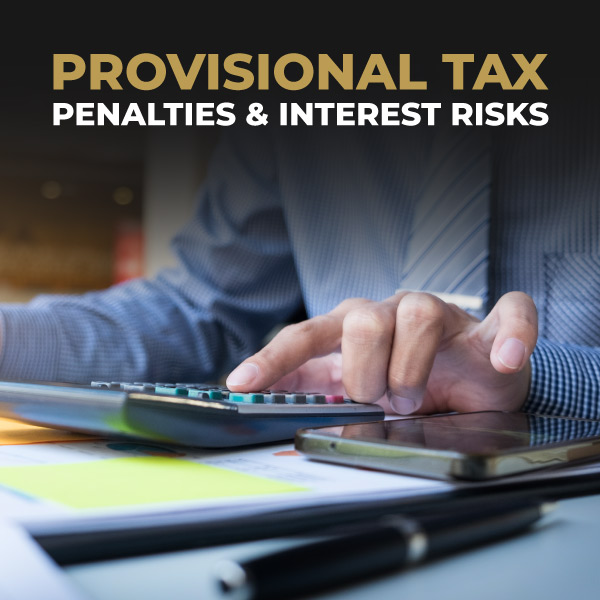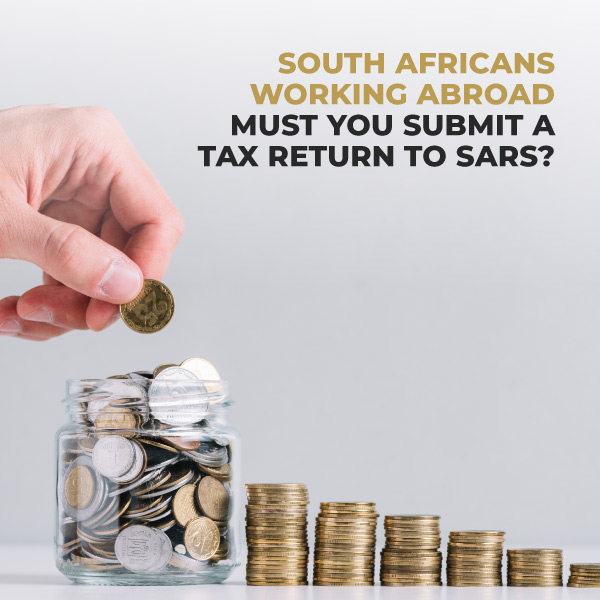PROVISIONAL TAX
PENALTIES AND INTEREST RISKS
Provisional taxpayers must comply with all requirements for filing returns and making payments in order to avoid risk of penalties and interest. Our article provides guidance on the risks attendant on being a provisional taxpayer, and how to mitigate them, as well as a short insert regarding COVID-19 tax relief.
Taxpayers who are required to pay provisional tax must comply with additional tax filing obligations together with their usual obligation to file an annual income tax return. As provisional taxpayers, these persons must quickly become familiar with their provisional tax obligations, failing which they are at risk of paying interest and/or penalties, in addition to the income tax payable.
Provisional tax obligations
In brief, provisional taxpayers must accurately estimate their taxable income for the year of assessment in question and pay income tax on this in advance. The estimate of taxable income is declared by completing and submitting a provisional tax return (IRP 6) twice per year, and simultaneously paying the corresponding amount of tax (if any). Provisional tax obligations are, therefore, separated into obligations in respect of each period, being the first and second periods.
The due dates for provisional tax payments, relative to the first and second periods, are typically as follows:
- First period: The provisional tax payment for the first period must be made within six months from the commencement of the year of assessment in question, i.e., if the year of assessment commences on 1 March, the first period for which provisional tax becomes due will be the period ending on 31 August.
- Second period: The provisional tax payment for the second period must be made not later than the last day of the year of assessment in question, i.e., if the year of assessment ends on 28 or 29 February, the second period for which provisional tax becomes due will be the period ending on 28 or 29 February.
Where any provisional taxpayer fails to comply with their provisional tax obligations, the penalties and interest which may be imposed will depend on whether the non-compliance was in respect of the first or second period.
First Period
Penalty for late payment of provisional tax
Provisional taxpayers are obliged to make timeous payment of their provisional tax. In the case of an individual (or trust), the due date would typically fall on 31 August and, in the case of a company, payment is due within six months from date of commencement of its financial year.
The failure by a provisional taxpayer to make payment on time will result in the imposition of what is known as a “penalty for late payment of provisional tax”, which is imposed in terms of paragraph 27 of the Fourth Schedule to the Income Tax Act, read with Chapter 15 of the Tax Administration Act. This penalty is calculated at 10% of the provisional tax amount not paid.
By way of a simple example, if a provisional tax amount of R700 000 was not paid or is paid late, the penalty that is levied will be 10% of R700 000, being R70 000.
Interest on overdue provisional tax as a result of late or non-payment
Interest is levied, in terms of section 89bis(2) of the Income Tax Act, on provisional tax due by the taxpayer as a result of late or non-payment and will continue to accrue until the taxpayer has paid the tax in full. Interest on overdue provisional tax is calculated at the “prescribed rate”, which is the rate of interest fixed by the Minister of Finance by notice in the Government Gazette.
Whilst the prescribed rate of interest fluctuates over time, the Government Gazette, dated 27 March 2020, published an interest rate of 9,75% as of 01 March 2020. The varying interest rates levied since 1 July 1982 have been tabulated by SARS and are available on the SARS website.
Second Period
Penalty and interest for late payment of provisional tax
The penalty imposed and interest levied for late payment of provisional tax, as discussed relative to the first period, are equally applicable to the second period. A failure by a taxpayer to make payment on time, typically 28 or 29 February, will result in the imposition of a 10% penalty and interest thereon at the prescribed rate until payment of the tax in full.
Penalty for the underpayment of provisional tax as a result of underestimation
A provisional taxpayer is at risk of a second type of penalty, imposed in terms of paragraph 20 of the
Fourth Schedule to the Income Tax Act, read with Chapter 15 of the Tax Administration Act, where the taxpayer’s actual taxable income for the year of assessment in question is more than the estimate of taxable income declared by the taxpayer to SARS on their provisional tax return. The taxpayer’s actual taxable income is determined on assessment of their normal income tax return, which is submitted subsequent to the filing of their provisional tax return.
The calculation of this penalty (known as an “underestimation penalty”) depends on whether the taxpayer’s actual taxable income is more than R1 million or whether the actual taxable income is equal to or less than R1 million. This will determine both the room for error, i.e., how much the taxpayer must have underestimated for the penalty to arise, as well as the amount of the penalty payable.
- Actual taxable income equal to or less than R1 million
If the taxpayer’s actual taxable income for the year of assessment was equal to or less than R1 million, an underestimation penalty will be levied if the taxpayer’s second period estimate of taxable income was less than 90% of the taxpayer’s actual taxable income, and the estimate was less than the “basic amount” applicable to the second period.
The basic amount is the taxable income assessed for the preceding year of assessment, less certain prescribed amounts as detailed in SARS’ Interpretation Note 1, titled “Provisional Tax
Estimates” (issue 3). A penalty will, therefore, not be levied if the taxpayer’s second period estimate of taxable income was greater than the applicable basic amount.
The amount of the underestimation penalty is calculated as 20% of the difference between:
- The lesser of:
- the amount of normal tax payable for the year of assessment on 90% of actual taxable income, after taking into account any amount of a rebate deductible in the determination of normal tax payable; and
- the amount of normal tax payable on a taxable income equal to the basic amount, after taking into account any amount of a rebate deductible in the determination of normal tax payable;
- and the total amount of tax paid by the taxpayer by the end of the year of assessment.
By way of an example, let us say that the taxpayer’s basic amount is R800 000 and, in the 2019 year of assessment, the taxpayer estimates (in the second period) a taxable income of R400 000 for the year of assessment but his actual taxable income was R700 000. The taxpayer in this example estimated an amount that is less than 90% of his actual taxable income and which is also less than the basic amount, thereby triggering an underestimation penalty. The tax on R700 000 is less than the tax on R800,000. If we assume the tax payable was R300 000 but based on the taxpayer’s estimate, the tax paid was R180,000, the penalty payable by the taxpayer in this example will be 20% of the difference between R300 000 and 180,000. i.e., 20% of R120 000, being R24 000.
- Actual taxable income is more than R1 million
If the taxpayer’s actual taxable income for the year of assessment exceeded R1 million, an underestimation penalty will be levied if the taxpayer’s second period estimate of taxable income was less than 80% of the taxpayer’s actual taxable income.
The amount of the underestimation penalty is calculated as 20% of the difference between:
- the amount of normal tax payable for the year of assessment on 80% of actual taxable income, after taking into account any amount of a rebate deductible in the determination of normal tax payable; and
- the total amount of tax paid by the taxpayer by the end of the year of assessment.
The calculation of the penalty payable in this instance is thus much simpler than where the taxpayer’s actual taxable income is equal to or less than the R1 million threshold, as the basic amount does not play a role in the calculation of this penalty.
Interest on the underpayment of provisional tax as a result of underestimation
Interest will, subject to the applicable taxable income threshold (R20 000 in the case of a company and R50 000 in any other case), be levied on provisional tax due by the taxpayer as a result of underpayment of provisional tax, according to section 89quat(2) of the Income Tax Act. Interest on underpayment of provisional tax is calculated at the prescribed rate.
Interest will accrue from seven months after the last day of the second period until date of assessment of the taxpayer’s income tax return. For most taxpayers who should have paid provisional tax in full by 28 or 29 February, interest will, therefore, accrue only from 1 October.
Avoidance and Remittance of Penalties and Interest
The only way for taxpayers to avoid triggering provisional tax penalties is to ensure that they correctly calculate their estimated taxable income for the year of assessment and that payment of the provisional tax is made on time. However, taxpayers are able to reduce their risk of having interest levied where they submit a third provisional tax return within seven months after the last day of the second period and pay the provisional tax shortfall.
That being said, where penalties and interest have already been imposed and levied, taxpayers may request SARS to remit all or a portion of such penalties and interest, provided that certain requirements are met. These requirements are laid down in the Fourth Schedule to the Income Tax Act, as well as Chapter 15 of the Tax Administration Act. Each category of penalty and interest comes with its own requirements for remission and taxpayers must therefore be mindful of this when making a request for remission to SARS.
COVID-19 Provisional Tax Relief
Together with the general principles on provisional tax discussed above, Government has implemented COVID-19 temporal provisional tax relief measures to assist with alleviating cash flow problems for tax compliant small to medium-sized businesses (“SME’s”) as a result of the COVID-19 outbreak.
The first tax measures were announced by the Minister in the 2020 Draft Disaster Management Tax Relief Bill and is governed according to the 2020 Draft Disaster Management Tax Relief Administration Bill. Following the publication of the Bills for comment on 1 April 2020, proposed amendments were accepted in the Explanatory Memorandum on the 2020 Disaster Management Tax Relief Bill, dated 1 May 2020, which amendments are deemed to have come into operation on 1 April 2020.
Requirements to claim provisional tax relief
Taxpayers who are required to submit provisional tax returns during the period 1 April 2020 to 31 March 2021, must meet the following requirements in order to qualify for provisional tax relief:
- The taxpayer must be a company, trust, partnership, or individual who is conducting a trade;
- Gross income of R100 million or less for the year of assessment ending on or after 1 April 2020 but before 1 April 2021;
- Gross income must not include more than 20% in aggregate of interest, dividends, foreign dividends, royalties, annuities, any remuneration received from an employer, and rental from the letting of fixed property unless it is the primary trading activity of the taxpayer and rental income is substantially the whole of its gross income; and
- The qualifying taxpayer must be fully tax compliant, i.e. returns across all tax types must be filed with SARS, and tax debts paid, or payment arrangements made with SARS regarding any outstanding tax debts.
Provisional tax relief
Qualifying taxpayers may defer a portion of the payment of their first and second provisional tax liability to SARS, without SARS imposing administrative penalties and interest on the deferred amounts for the first and second period:
- The first provisional tax payment due during 1 April 2020 to 30 September 2020 will be based on 15% of the estimated total tax liability;
- The second provisional tax payment due during 1 April 2020 to 31 March 2021 will be based on 65% of the estimated total tax liability (after deducting the 15% payment amount received from the first period); and
- Provisional taxpayers with deferred payments will be required to pay the remaining 35% of their tax liability when making the third provisional tax payment, to avoid interest charges on assessment.
By way of example, we can consider an SME with a February 2021 year end, with the first provisional tax payment due by 31 August 2020. If we assume the estimated total tax liability is R2 000 000, the first provisional tax payment amounts to R300 000, which is 15% of the estimated total tax liability. On the second provisional tax payment due by 28 February 2021, a payment of R1 000 000 is required, which is 65% of the estimated total tax liability less the R300 000 already paid. The remaining balance of R700 000 is payable during the third provisional tax period, without interest charges accruing.
Consequences of claiming provisional tax relief and not meeting the requirements
If a qualifying taxpayer is not tax compliant, or where it is later discovered that the taxpayer did not qualify for the provisional tax relief measures, no tax relief will be granted and normal penalties and interest will apply to the provisional account. The qualifying taxpayer should therefore rectify its tax compliance status before submitting the relevant returns with SARS.
Conclusion
A detailed explanation of the law relating to provisional tax, including the consequences of non-compliance, is provided in SARS’ Interpretation Note 1. A simplified and more practical explanation is available in the form of SARS’ External Guide for Provisional Tax.
Both documents are expressly caveated as published merely for guidance and information purposes, and which is not to replace expert advice. Provisional taxpayers are ultimately responsible for their own tax affairs and must comply to avoid risk of penalties and interest.
AUTHOR

Darren Britz |



